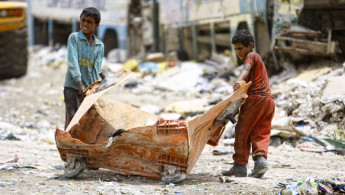Iraq wants more weapons - can it afford them?
Iraqi Prime Minister Haider al-Abadi met President Obama on Tuesday to ask for more weapons and logistical support for the Iraqi government's fight against Islamic State (IS).
But the expansion of the group, also known as ISIS, is not the only crisis facing Iraq's central government. Last year's collapse in oil prices have slashed Iraq's income at a time when it is spending more than ever on defence.
With a third of Iraq's workforce depending on public sector jobs, the government's financial woes could have a severe
| Almost a third of Iraqi families live in poverty. |
impact on a population already struggling with high levels of poverty.
Revenue from oil accounts for over nine-tenths of Iraqi government revenues. So when the price of a barrel of crude fell from $110 in June last year to $50 this January, Baghdad's finances took a massive hit.
"They hadn't expected prices to change so dramatically," Sajad Jiyad of Integrity, a think-tank, told al-Araby al-Jadeed.
In January the Iraqi parliament approved a $105bn, putting the country's deficit at around $22bn at a time when the country is desperately seeking finance for its military efforts against IS.
According to data from the Stockholm International Peace Research Institute (SIPRI), Iraq's military spending rose by some 15 percent last year following the Iraqi army's ouster from Mosul and much of the north-west of the country.
As it continues to battle IS militants in Anbar and Ninevah provinces, the government is already struggling to meet the associated costs - fuel, supplies, weapons and new equipment intended to give the central government a strategic edge over IS.
Iraq expects to take delivery of the first of a batch of F-16 fighter jets in the summer, Reuters reported on Monday. Those 36 jets alone are worth some $65 million apiece - a total of over $2 billion.
Adding to the uncertainty over whether Iraq will be able to pay its bills is the prospect of a further fall in oil prices. Iraqi officials say a deal between the west and Iran over Tehran's nuclear programme could have a direct impact on their finances.
"The nuclear deal could have a negative impact on Iraq, as Iran would go back to exporting oil on international markets, pushing down prices which are already low," said Noura al-Jibari, a member of the Financial Committee in the Iraqi parliament, told al-Araby al-Jadeed.
Shocks to Iraq's oil output could also hit budgets. Last week Islamic State (IS) militants launched suicide attacks against Iraq's largest oil refinery. Similar attacks that threaten production and export are a serious threat to the country's economic future.
The situation is so bad that Iraq has asked the International Monetary Fund (IMF) for emergency funding, Finance Minister Hoshyar Zibari announced last week. The New York times reported that Abadi is seeking billions in emergency funding from the United States and international bodies. It said he plans to meet this week with the directors of the IMF and the World Bank.
Whatever is agreed, it is ordinary Iraqis who will face the worst impacts of the crisis. Almost a third of Iraqi families are already below the poverty line. As the government struggles to balance its books, the salaries of teachers, local officials and police officers have already been delayed. There is a real possibility that Iraq will soon find itself unable to meet its obligations, said Jiyad.
"If they don't get some new revenue streams by the end of the summer, Iraq will struggle to meet salaries by end of year."



